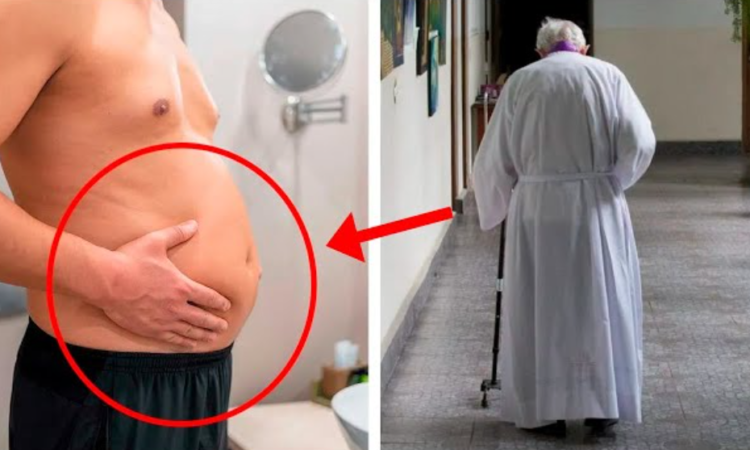
A priest begins to show symptoms of pregnancy, and his belly begins to grow. When the church forces him to take a test, and the result comes back positive, his world is turned upside down. In the heart of a small town, surrounded by Green Hills and cobbled streets, lived Father Augustus, a devoted man of faith with a kind heart. His days were filled with prayers, masses, and the spiritual guidance of the members of the church. However, something unusual began to disturb his peaceful routine. It was a cool spring morning when the priest noticed for the first time that his belly seemed to be inexplicably growing.
“I must be imagining things,” he thought at first, putting aside his concerns. But as the days went by, his swollen belly became more evident, and there was no ignoring the growing belly under his priestly robes. Intrigued and somewhat worried, the priest decided to seek advice from Bishop Lorenzo, a man of great wisdom and understanding, hoping to find some explanation or consolation.
In a secluded room full of ancient books and sacred icons, they had a meeting on the very peculiar matter. “I don’t understand, Lorenzo. My health has always been good, but now my stomach, it’s like I’m swelling up for no reason,” he confessed, his voice filled with a mixture of confusion and concern.
“Augustus, you need to see a doctor. This could be more serious than we think,” replied the bishop, his serious expression reflecting the gravity of the situation. His words echoed in the poor priest’s mind as he took his morning walk through the church garden.
The morning sun cast soft shadows through the ancient oaks, and bird songs filled the air with melody. But the beauty of that morning couldn’t dispel the worry that was growing inside him. “Is this a test of faith, Lord?” he wondered, searching for answers in the comforting sounds of nature. “Or is there something I’m failing to see? A lesson to be learned?” he murmured, almost hoping that the wind would bring an answer.
The churchgoers, who had always greeted him with smiles and friendly conversations, now cast curious glances at his belly, gossiping among themselves. Father Augustus could feel their gazes, each one like an additional weight on his shoulders. His hand touched his growing belly like a habitual gesture, as if he were trying to understand what was happening to him.
“I trust in you, Lord, to guide me through this tribulation,” he prayed silently, with his unshakable faith even in the face of the unknown. “May your will be done, and may I find the strength to face what lies ahead.”
With every step, Augustus’s concern grew, as did his belly. He knew he could no longer ignore the situation. It was time to seek answers, not only for his own peace of mind, but also to calm the concerns of his community.
As he made his way back to the seclusion of his quarters, preparing to make a doctor’s appointment, a mixture of worry and confusion showed on his face, reflecting the internal battle between faith and uncertainty.
A few weeks later, after a series of tests, Father Augustus sat alone in the waiting room of the doctor’s office, his hands intertwined in silent prayer, seeking comfort in the faith that had always guided him. The soft light of dusk seeped through the windows, bathing the room with a golden light. But the beauty of the moment did little to calm his restless spirit.
Finally, the door opened, and the doctor walked in, a middle-aged doctor who had seen everything, but that, and with a reputation for excellence and compassion. His normally serene face bore an expression of perplexity that immediately alarmed the priest.
Sitting in front of the doctor in a room full of diplomas and medical books, Augustus prepared himself to hear what had caused the inexplicable growth of his belly. But even the doctor hesitated for a moment, as if the words he was about to say defied all medical logic and reason.
“Father Augustus, the results are unusual. It is impossible, but it is true. You’re pregnant. Your pregnancy test came back positive.”
“Positive? But how? That must be a mistake,” the man’s voice trembled, mixing incredulity and shock. The idea was so absurd, so contrary to nature, that his first instinct was to reject it completely.
The doctor shared the feeling of confusion, admitting that such a diagnosis challenged not only science but also biology itself.
“I’m as perplexed as you are. This goes beyond my medical comprehension. I suggest we do more tests to better understand what’s going on.”
The news spread like wildfire through the hospital, reaching the ears of the congregation and the clergy faster than Father Augustus could have imagined. In a matter of hours, what was a moment of personal vulnerability became a subject of intense public debate.
At an emergency meeting called by Bishop Lorenzo, the clergy gathered in a state of shock and disbelief. The room, usually a place of quiet reflection and theological discussion, was charged with an energy of urgency and confusion.
“This is a test of our faith. We need to support Augustus but also seek the truth,” declared one of the older priests, his voice firm, although his hands were slightly shaking.
While some welcomed the situation with an open mind, pondering the theological and spiritual implications, others expressed their strangeness and skepticism, unable to accept the reality of the facts.
The poor priest at the center of this storm of emotions and speculation felt increasingly isolated. His indignation was palpable, not only at the invasion of his privacy but also at the impossibility of the situation. And yet, his belly continued to grow, showing that whatever happened, this mystery still needed an explanation.
And as night fell over the small town, Father Augustus’s story and the suspense of his condition only began to unfold, promising revelations that could shake the foundations of the community and beyond.
As gossip spread like wildfire, it wasn’t long before everyone in the small town heard the news of his pregnancy. The once quiet streets vibrated with the constant buzz of residents, each sharing their version of the story, each more incredulous than the last.
“Did you hear? They say he might be expecting a baby. How can a man be pregnant? Is it a miracle, perhaps?” muttered a lady, her gaze fixed on a group of neighbors gathered outside the bakery.
The rumors were intertwined with theories and suppositions, each one more extravagant than the last. Meanwhile, within the sacred walls of the church, an atmosphere of tension and disbelief was present.
The clergy, in an emergency meeting, fervently discussed the course of action. Old books were reviewed, records thoroughly examined, and Father Augustus’s life dissected from childhood to the present.
“We need to understand Augustus’s origins and check every detail of his life. Where was he born? How did he grow up? Everything. If he’s well, a real man, then… Oh Lord, what have we come to?” one of the clerics was stunned by the ideas swirling around the city.
“Are you all going mad?” Father Augustus reacted to the speculation with disbelief and indignation. The idea that his faith and his commitment to the church could be questioned in this way hurt him deeply.
“I have dedicated my life to God, to the church, and to our community. How can you question who I am now and doubt
that I am a man?” his voice echoed through the aisles of the church, laden with sadness, frustration, and urgency.
The church members, for their part, were divided. Some defended the priest, attributing the event to a miracle or a test of faith. Others, however, succumbed to fear and distrust, whispering among themselves about the implications of the revelation.
As her belly grew, taking on the proportions of a six-month pregnancy, the pressure on Augustus increased. Curiosity both inside and outside the church community became unsustainable. It was then that the church decided he would undergo an ultrasound, in the hope that the examination would provide answers, whether or not he would be stripped of his post and lose his…
… credibility.
“Only after we see the fetus will we be able to decide what to do,” said the bishop, his grave expression reflecting the weight of the situation.
In this atmosphere of expectation and uncertainty, Father Augustus’s story became a turning point for everyone, a moment that promised to reveal not only the truth about his condition but also the true character of his faith and those around him.
Even though he was reluctant, the poor priest had to have the ultrasound, and worse, with bishops and priests inside the room, watching everything closely. The tension in the air was almost palpable when Augustus, accompanied by an entourage of clerics, entered the ultrasound room. The weight of uncertainty and the fear of losing his community, his position in the church, his cassock, weighed heavily on his shoulders. Left with no choice, he lay down on the stretcher, with the cold gel spread over his now prominent belly.
The doctor, with a concentrated expression and who was also gagging with curiosity, began the examination. The room fell into an expectant silence, broken only by the hum of the ultrasound machine. All eyes were fixed on the screen, searching for an answer, an explanation for the phenomenon that defied comprehension.
“What… impossible… what is this?” the doctor’s voice broke the silence, tinged with disbelief and confusion. He was adjusting the controls, frowning, clearly trying to understand what he was seeing.
Father Augustus felt his heart racing, fear and anxiety intertwining in his chest. “What is it, doctor?” said one of the clerics, his voice laden with tension. The room was filled with an atmosphere of suspense, each second stretching out like an eternity.
The doctor continued examining, moving the transducer to different angles, looking for some clarity. Father Augustus, for his part, struggled with his own thoughts, fearing what the image on the screen might reveal. The idea of carrying a baby, although absurd, had taken root in his mind, bringing with it a whirlwind of conflicting emotions.
Finally, the doctor switched off the device. The silence that followed was suffocating. “Father, I have good news and bad news,” he began, facing Augustus directly. The priest, along with the clerics, waited, holding his breath.
“The good thing is that you’re not pregnant,” the relief that followed was palpable, a collective sigh filled the room. “Hallelujah! God is good!” they shouted and celebrated. Father Augustus felt tears welling up, as a mixture of relief and joy coursed through him. The clerics looked at each other, sharing a moment of jubilation.
However, the doctor’s expression remained serious, bringing the atmosphere back to sobriety. “What we have here is not a pregnancy, unfortunately. It’s a tumor,” the revelation hit like a bombshell, the momentary relief giving way to a new wave of concern.
The priest, still trying to process the news, asked in a weak voice, “What is it exactly?” “From what I was able to identify, it’s a teratoma, I presume. It’s very rare,” the doctor explained, “but we’ll need to do more tests to find out how the tumor is behaving in your body.”
The man was quickly subjected to a series of complimentary tests, which confirmed the unusual nature of his condition. A few days later, the results came out. It turned out that the tumor, as well as being bizarre in its composition, was hormone-secreting, a revelation that shed light on his previously enigmatic situation.
Meeting with a team of specialists, everything was explained to the priest, who listened attentively as they explained the uniqueness of his case. “This type of tumor is extremely rare,” began one of the doctors, an endocrinologist who had been brought in to help unravel Augustus’s hormonal mystery.
“Teratomas are germ cell tumors that can contain tissues of any shape, such as hair, teeth, and, in some cases, more complex tissues. However, what makes your case particularly unusual is that the teratoma was somehow producing the human chorionic gonadotropin hormone that is secreted when a woman is pregnant. As a result, your body began to simulate the symptoms of pregnancy, and that’s why your belly began to grow.”
Augustus, who had spent hours on the internet trying to understand his condition, asked, “So, I’m really a man? I don’t have female organs, right?”
“Yes, without a doubt,” confirmed the specialist, noticing the relief on the poor priest’s face when he heard the confirmation of his masculinity. “And with surgery, we should be able to remove the tumor and normalize your hormone levels.”
The surgery was scheduled without delay, and the medical team acted with precision and care to extract the teratoma. The operation was a success, marking the beginning of Father Augustus’s recovery, both physically and emotionally.
During the days that followed, as he regained his strength in the hospital, the man had plenty of time to reflect on his journey. The experience had been more than a medical ordeal; it had been a spiritual and emotional journey that had tested him in ways he would never have imagined.
He thought about the reactions of his community, the conspiracy theories, the hasty judgment, and the wave of support that eventually came when the truth came out. He reflected on what it means to be a man, to be human, and the complexity of divine creation.
“This ordeal taught me about compassion, judgment, and the complexity of God’s creation,” Father Augustus finally concluded. He emerged from the experience not only with a new perspective on life and faith but also with a renewed sense of purpose and a deeper understanding of his own identity.
Through this ordeal, he had found a strength he had never known he possessed and a compassion that he now knew was fundamental to his vocation. Upon returning to the parish, Father Augustus was welcomed not only as the spiritual leader he had been before but also as a living symbol of resilience and truth.
His congregation, which had followed every twist and turn of his unbelievable journey, now saw him in a new light. The next Mass was not just a religious ritual; it became a celebration of understanding and the ability to overcome life’s struggles.
“My journey has been a test of faith, not just for me but for all of us,” he began, his voice resonating through the church. “May it remind us of the importance of seeking the truth, of keeping an open mind and a loving heart.”
His message, although personal, had a universal appeal, deeply touching the hearts of those present. At the end of the sermon, one of the older bishops stood up, approached the pulpit with measured steps, and in front of the entire congregation, expressed an apology on behalf of the church.
“We apologize for doubting you, Father Augustus. Your strength and faith are an example to us all. We shouldn’t have judged you without first having proof. So, forgive us,” the man’s words, although simple, marked a moment of deep reconciliation and understanding.
Father Augustus’s story, now known beyond the confines of his community, began to inspire people around the world. Blogs, articles, and even documentaries began to portray his experience as a testimony to the complexity of the human condition and the importance of empathy.
The lessons learned on his journey transcended the religious sphere, reaching a global and diverse audience, reinforcing the message of understanding and acceptance
. “Priest gets pregnant, and the outcome is impressive,” said the headlines of several newspapers around the world.
Over time, the priest took advantage of his unique experience to foster dialogues about faith, science, identity, and the need for compassionate judgment. He became a popular speaker, sharing his story and lessons learned with schools and organizations, promoting a culture of inclusion and mutual respect.
His story also served as a reminder that however much science can explain the phenomena of the world, faith and compassion are essential for true understanding and acceptance of the unknown.
Father Augustus, through his experience, became a link between faith and reason, showing that both can coexist harmoniously, guiding humanity along a path of greater empathy and love. In the end, the priest’s journey wasn’t just about overcoming a surprising medical diagnosis; it was about breaking down prejudice, strengthening belief, and celebrating human diversity.
He taught the world that each individual is a complex universe worthy of respect and understanding. And perhaps most importantly of all, he reinforced the idea that love and compassion are the greatest virtues any human being can aspire to possess.




